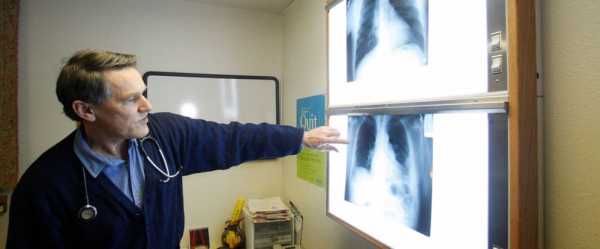
MISSOULA, Mont. — A health clinic in a Montana town plagued by deadly asbestos contamination faces millions of dollars in penalties — and potential bankruptcy — after a jury found it submitted more than 300 false asbestos claims to the U.S. government, making patients eligible for Medicare and other benefits they shouldn't have received.
The federally funded Center for Asbestos Related Disease clinic has been at the forefront of the medical response to deadly pollution from mining near Libby, Montana.
The town of about 3,000 people along the scenic Kootenai River gained national notoriety when it was declared a Superfund site two decades ago, following media reports that workers and their families were getting sick and dying due to dust from a W.R. Grace mine.
A seven-person jury said Wednesday night that the clinic's false claims caused more than $1 million in damages to the federal government. Under federal law, the clinic is liable for three times the damages — or about $3.2 million — and millions of dollars more in potential penalties.
The verdict also could undermine lawsuits from asbestos victims against BNSF Railway and other entities that courts held liable for turning Libby into one of the nation’s deadliest polluted sites. Health officials have said at least 400 people have been killed and thousands sickened from asbestos exposure in the Libby area.
The trial against the Center for Asbestos Related Disease clinic followed a civil lawsuit filed by BNSF in 2019 under the False Claims Act, which allows private parties to sue on the government’s behalf. BNSF’s lawsuit alleged the center submitted claims on behalf of more than 300 patients without sufficient confirmation that they had asbestos-related disease. The jury agreed.
However, the railway also said 1,369 people received federal benefits with no proper disease diagnosis — an argument the jury rejected.
Former Libby resident Judy Woller's husband worked at the mine and died of lung cancer in 2015 after being treated at the center. Woller said her lungs, too, have been scarred from asbestos exposure, a condition she said was determined by the clinic. She has a pending lawsuit against BNSF on behalf of her husband.
“They ought to be ashamed of themselves for tarnishing that clinic,” Woller said in a telephone interview. “They're a big corporation of course and it always comes down to money. They don't want to pay money for lawsuits where they know they were in the wrong.”
The center's Executive Director Tracy McNew said Thursday that it plans to appeal the verdict and had tried to abide by the law. She said the ruling if it stands would bankrupt the clinic.
“We will absolutely change our practices if that’s what’s needed. But we think we’re doing it right, so we’re surprised” by the verdict, she said.
The jury's verdict did not specify which patients were involved in the false claims. McNew said she was trying to get clarity from the Social Security Administration — which oversees Medicare — on who the patients are and whether they will lose any government services.
A Social Security Administration spokesperson responded by email to an Associated Press query about the case, but did not immediately answer questions about the false claims and whether patients would lose benefits.
Federal prosecutors previously declined to intervene in the case, and there have been no criminal charges related to false claims from the center.
The clinic and its high-profile doctor, Brad Black, have certified more than 3,400 people with asbestos-related diseases, according to court documents. It has received more than $20 million in federal funding.
Attorneys for the center had argued during a 12-day civil trial that its diagnoses were in line with requirements of the 2010 Affordable Care Act, which included special provisions for the Libby victims.
BNSF — owned by billionaire Warren Buffett — is a defendant in numerous lawsuits over its own role in the town’s contamination. In 2020, Montana’s Supreme Court found BNSF liable for shipping asbestos-tainted vermiculite from a nearby mine through Libby.
The railway could be eligible for 15% to 25% of any amount recovered by the government from the false claims case.
Asbestos-related diseases can range from a thickening of a person’s lung cavity that can hamper breathing, to deadly cancer.
Exposure to even a minuscule amount of asbestos can cause lung problems, according to scientists. Because of the long latency period for those diseases, symptoms can take decades to develop.
The 2010 federal health law made victims of asbestos exposure in the Libby area eligible for Medicare, housekeeping, travel to medical appointments and disability benefits for those who can’t work.
Dr. Black, a pediatrician, has said the ailments caused by the type of asbestos in Libby are difficult to detect and can be missed by outside radiologists less familiar with it than he is.
During closing arguments in the false claims trial, BNSF attorney Adam Duerk criticized Black’s stated ability to perceive early signs of asbestosis disease that others missed.
“That’s not the practice of medicine. That’s the practice of roulette,” Duerk said. “When you see it, when you’re certain it’s there, that’s when you diagnose, not before.”
The Center for Asbestos Related Disease clinic's defense in the false claims case was hampered by a ruling that barred testimony on its behalf from former U.S. Sen. Max Baucus of Montana, who helped craft the Libby provision in the health law.
___
Brown reported from Denver.
Sourse: abcnews.go.com






